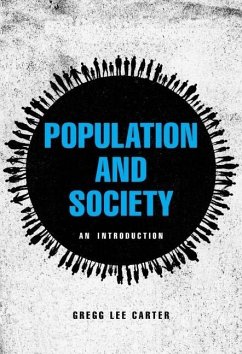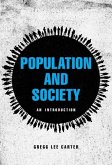This exciting new book presents the field of social demography, animating the study of population with a vibrant sociological imagination. Gregg Lee Carter provides multiple demonstrations of how taking a demographic perspective can give us a better understanding of social phenomena once thought to be largely the products of culture, politics, or the economy.
Five key chapters concentrate on (1) the social and individual determinants of fertility, mortality, and migration; (2) the social and individual impacts of changing levels of fertility, mortality, and migration; and (3) the impacts of overpopulation on the environment, and how changes in the environment, in turn, impact the human condition, especially regarding migration. What gives these analyses coherence is how each emphasizes the ways in which demographic forces both reflect and limit individual choices.
Written in a straightforward and engaging style, and without getting bogged down in academic debates,this concise book is the ideal introduction and primer for courses in social demography and population and society.
Hinweis: Dieser Artikel kann nur an eine deutsche Lieferadresse ausgeliefert werden.
Five key chapters concentrate on (1) the social and individual determinants of fertility, mortality, and migration; (2) the social and individual impacts of changing levels of fertility, mortality, and migration; and (3) the impacts of overpopulation on the environment, and how changes in the environment, in turn, impact the human condition, especially regarding migration. What gives these analyses coherence is how each emphasizes the ways in which demographic forces both reflect and limit individual choices.
Written in a straightforward and engaging style, and without getting bogged down in academic debates,this concise book is the ideal introduction and primer for courses in social demography and population and society.
Hinweis: Dieser Artikel kann nur an eine deutsche Lieferadresse ausgeliefert werden.
"Anyone wanting to learn the basics of demography and the ways it relates to broader social forces will profit from reading this book. Carter provides an overview of the field that is informative and wide-ranging."
William H. Frey, The Brookings Institution
"Carter offers a comprehensive yet concise overview of the major concepts, theories, and data sources in the fields of classic and social demography. Written in an accessible style and leveraging the most recent data from countries around the world, the book highlights the salience of the demographic perspective in understanding all contemporary social problems and provides multiple examples of how demographic forces both reflect and constrain individual choices."
Shannon Monnat, Pennsylvania State University
"Population and Society does an outstanding job of bringing to life demographic processes such as fertility, mortality, and migration by illustrating their impact using a range of student-engaging, in-depth examples and easy-to-understand data. The book applies demographic events to a range of critical social issues, from environmental degradation, overpopulation, and gender inequality, to the everyday choices we make in our own lives. In short, this book is an outstanding accomplishment!"
Sharlene Hesse-Biber, Boston College
William H. Frey, The Brookings Institution
"Carter offers a comprehensive yet concise overview of the major concepts, theories, and data sources in the fields of classic and social demography. Written in an accessible style and leveraging the most recent data from countries around the world, the book highlights the salience of the demographic perspective in understanding all contemporary social problems and provides multiple examples of how demographic forces both reflect and constrain individual choices."
Shannon Monnat, Pennsylvania State University
"Population and Society does an outstanding job of bringing to life demographic processes such as fertility, mortality, and migration by illustrating their impact using a range of student-engaging, in-depth examples and easy-to-understand data. The book applies demographic events to a range of critical social issues, from environmental degradation, overpopulation, and gender inequality, to the everyday choices we make in our own lives. In short, this book is an outstanding accomplishment!"
Sharlene Hesse-Biber, Boston College









